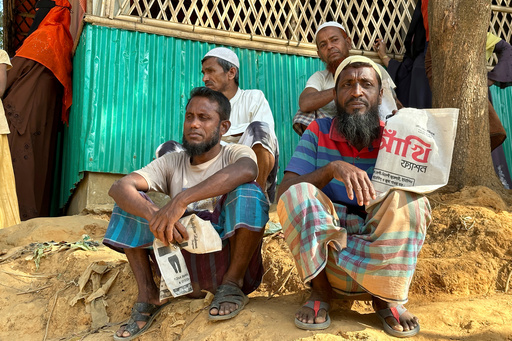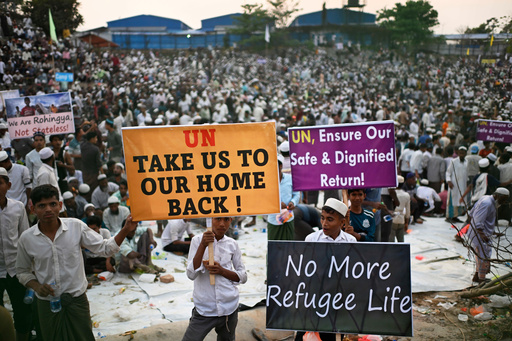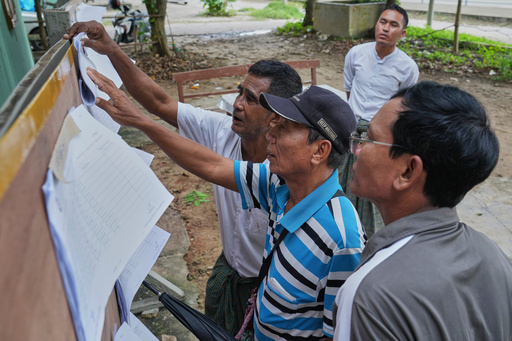Rohingya Muslims plead for help at the UN to stop the killings in Myanmar
News > International News

Audio By Carbonatix
6:07 PM on Wednesday, October 1
By EDITH M. LEDERER
UNITED NATIONS (AP) — Rohingya Muslims pleaded with the international community at the first United Nations high-level meeting on the plight of the ethnic minority to prevent the mass killings taking place in Myanmar and to help those in the persecuted group lead normal lives.
“This is a historic occasion for Myanmar, but this is long overdue,” Wai Wai Nu, the Rohingya founder and executive director of the Women’s Peace Network-Myanmar, told ministers and ambassadors from many of the U.N.’s 193-member nations in the General Assembly Hall.
The Rohingya and other minorities in Myanmar have suffered decades of displacement, oppression and violence, while seeing no action in response to determinations that they are victims of genocide, she said. “That cycle must end today," Wai Wai Nu said.
Buddhist-majority Myanmar has long considered the Rohingya Muslim minority to be “Bengalis” from Bangladesh even though their families have lived in the country for generations. Nearly all have been denied citizenship since 1982.
In August 2017, attacks by a Rohingya insurgent group on Myanmar security personnel triggered a brutal campaign by the military that drove at least 740,000 Rohingya to Bangladesh. The military is accused of mass rape, killings and burning villages, and the scale of its operation led to accusations of ethnic cleansing and genocide from the international community, including the U.N.
Myanmar has been wracked by violence since the military ousted the elected government of Aung San Suu Kyi in February 2021 and brutally suppressed nonviolent protests. That triggered armed resistance and fighting across the country by pro-democracy guerrillas and ethnic minority armed forces seeking to oust the military rulers, including in western Rakhine state where tens of thousands of Rohingyas still live, many confined to camps.
The United States in 2022 said it had determined that members of the Myanmar military committed crimes against humanity and genocide against the Rohingya.
U.N. refugee chief Filippo Grandi, who recently visited Myanmar, told the high-level meeting Tuesday that Bangladesh is now hosting close to 1.2 million Rohingya refugees, and since fighting reignited in Rakhine in 2024 between the military and the Arakan Army, an additional 150,000 have sought safety in the neighboring country.
The Arakan Army, the well-armed military wing of the Rakhine ethnic minority, which seeks autonomy, now controls almost all of Rakhine state, Grandi said, and the situation of the Rohingya there has not improved.
They still face discrimination, the burning of their villages, exclusion from work, a ban on moving freely, restricted education and health care and the threat of arrest, he said. “They are subjected to forced labor and forced recruitment” and “their lives are defined every day by racism and fear," Grandi said.
Julie Bishop, the U.N. special envoy for Myanmar, said there was little sign that the political crisis could be settled, with no agreed ceasefire, pathway to peace or political solution.
The government is preparing for elections starting in late December, but U.N. human rights chief Volker Turk said they will not reflect the will of the people or create a foundation for lasting peace. The election will be held under military control, the Rohingya can’t vote because they have been deprived of citizenship, and ethnic Rakhine parties have been disqualified from running.
Rofik Huson, founder of the Arakan Youth Peace Network, told the assembly that despite decades of persecution the Rohingya’s “deepest wish” is to live in their ancestral homeland, Myanmar, in peace and security.
“Yet, the past decade has shown that it’s not possible for us without international support, without international pressure,” he said. He called for the creation of a U.N.-supervised safe zone in northern Rakhine state along the border with Bangladesh.
Maung Sawyeddollah, founder of the Rohingya Student Network, speaking in an impassioned voice, said without self-determination for the Rohingya and international protection in Rakhine there can be no lasting peace. “The U.N. must mobilize resources to empower Rohingya," he told world leaders.
General Assembly President Annalena Baerbock, who chaired the meeting, ended it saying, “Today is just a starting point, we have to do more.” She promised an action-oriented follow-up.










